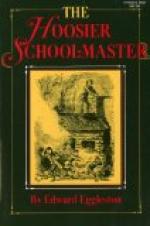And it was a good thing for Ralph that the danger hanging over Shocky made immediate action necessary.
FOOTNOTES:
[Footnote 23: The total absence of the word pail not only from the dialect, but even from cultivated speech in the Southern and Border States until very recently, is a fact I leave to be explained on further investigation. The word is an old one and a good one, but I fancy that its use in England could not have been generally diffused in the seventeenth century. So a Hoosier or a Kentuckian never pared an apple, but peeled it. Much light might be thrown on the origin and history of our dialects by investigating their deficiencies.]
CHAPTER XX.
GOD REMEMBERS SHOCKY.
At four o’clock the next morning, in the midst of a driving snow, Ralph went timidly up the lane toward the homely castle of the Meanses. He went timidly, for he was afraid of Bull. But he found Bud waiting for him, with the roan colt bridled and saddled. The roan colt was really a large three-year-old, full of the finest sort of animal life, and having, as Bud declared, “a mighty sight of hoss sense fer his age.” He seemed to understand at once that there was something extraordinary on hand when he was brought out of his comfortable quarters at four in the morning in the midst of a snow-storm. Bud was sure that the roan colt felt his responsibility.
In the days that followed, Ralph often had occasion to remember this interview with Bud, who had risked much in bringing his fractured arm out into the cold, damp air. Jonathan never clave to David more earnestly than did Bud this December morning to Ralph.
“You see, Mr. Hartsook,” said Bud, “I wish I was well myself. It’s hard to set still. But it’s a-doing me a heap of good. I’m like a boy at school. And I’m a-findin’ out that doing one’s best licks fer others ain’t all they is of it, though it’s a good part. I feel like as if I must git Him, you know, to do lots for me. They’s always some sums too hard fer a feller, and he has to ax the master to do ’em, you know. But see, the roan’s a-stomping round. He wants to be off. Do you know I think that hoss knows something’s up? I think he puts in his best licks fer me a good deal better than I do fer Him.”
Ralph pressed Bud’s right hand. Bud rubbed his face against the colt’s nose and said: “Put in your best licks, old fellow.” And the colt whinnied. How a horse must want to speak! For Bud was right. Men are gods to horses, and they serve their deities with a faithfulness that shames us.
Then Ralph sprang into the saddle, and the roan, as if wishing to show Bud his willingness, broke into a swinging gallop, and was soon lost to the sight of his master in the darkness and the snow. When Bud could no more hear the sound of the roan’s footsteps he returned to the house, to lie awake picturing to himself the journey of Ralph with Shocky and the roan colt. It was a great comfort to Bud that the roan, which was almost a part of himself, represented him in this ride. And he knew the roan well enough to feel sure that he would do credit to his master. “He’ll put in his best licks,” Bud whispered to himself many a time before daybreak.




